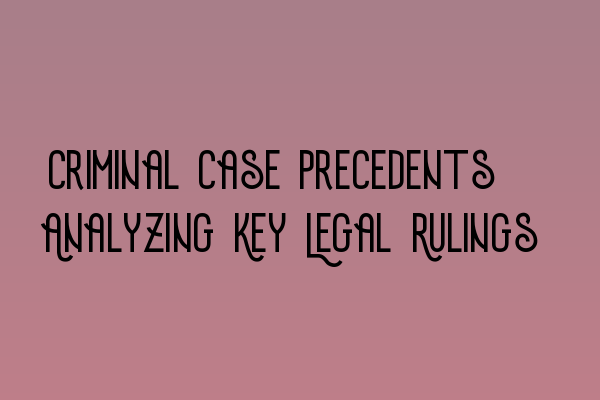Criminal Case Precedents: Analyzing Key Legal Rulings
Welcome to SQE Criminal Law & Practice Law UK, where we delve deep into the world of criminal law and judicial precedents. Today, we will explore the significance of criminal case precedents and analyze some key legal rulings that have shaped the criminal justice system. Understanding these precedents is crucial for legal professionals and aspiring solicitors preparing for the Solicitors Qualifying Examination (SQE) in the UK.
What are Criminal Case Precedents?
In legal terms, precedents are previous court decisions that provide a framework for interpreting and deciding similar cases in the future. Criminal case precedents specifically refer to decisions made in criminal cases, which establish legal principles and rules that subsequent courts rely on. These precedents play a vital role in maintaining consistency and ensuring fairness in the criminal justice system.
Criminal case precedents are binding on lower courts, meaning they must be followed unless there are exceptional circumstances or the decision is overturned by a higher court. They serve as authoritative guidance for judges, lawyers, and legal professionals while arguing cases, drafting legal strategy, and advising clients.
Analyzing Key Legal Rulings
We will now delve into some notable criminal case precedents and analyze their significance:
The Rothwell case
The Rothwell case, as discussed in our SQE 2 Preparation Courses article, involved a landmark ruling on self-defense in cases of involuntary manslaughter. The ruling established that an individual who kills another person in self-defense must genuinely and reasonably believe that their life is in immediate danger. This precedent has since been relied upon in numerous cases to determine justifiable self-defense, ensuring a fair and consistent approach to these situations.
The Woolmington case
In the Woolmington case, as mentioned in our SQE 1 Preparation Courses article, the Court of Criminal Appeal established the principle of “innocent until proven guilty.” This ruling set a high burden of proof on the prosecution, requiring them to prove the defendant’s guilt beyond a reasonable doubt. The Woolmington case remains a cornerstone of criminal law and serves as a reminder of the fundamental principles of justice.
The R v Jogee case
The R v Jogee case, also known as the “joint enterprise” case, as highlighted in our SRA SQE Exam Dates article, brought significant changes to the law surrounding secondary liability. The Supreme Court ruled that the mental element (mens rea) required for a secondary party to be held responsible should be clarified. This ruling overturned previous precedents and established a stricter test for convicting individuals involved in crimes committed by others. The Jogee case has had wide-ranging implications for cases involving joint enterprise, reshaping the legal landscape.
Conclusion
Criminal case precedents provide essential guidance for legal professionals and help maintain consistency and fairness within the criminal justice system. Understanding key legal rulings, such as the Rothwell case, the Woolmington case, and the R v Jogee case, is crucial for solicitors preparing for the SQE exams and for anyone interested in criminal law. Stay tuned for more informative articles, practice exams, and preparation resources from SQE Criminal Law & Practice Law UK.
